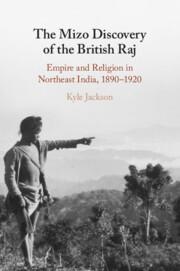Book contents
- The Mizo Discovery of the British Raj
- Additional material
- The Mizo Discovery of the British Raj
- Copyright page
- Dedication
- Contents
- Figures
- Maps
- Abbreviations
- Introduction
- 1 Coming into View
- 2 Reading the Forest
- 3 Adopting the Missionary
- 4 Sensing the Mission
- 5 Crisis and Conversion
- 6 Conclusion
- Glossary
- Bibliography
- Acknowledgements
- Index
3 - Adopting the Missionary
Messages, Commodities, Technologies (1894–1908)
Published online by Cambridge University Press: 12 October 2023
- The Mizo Discovery of the British Raj
- Additional material
- The Mizo Discovery of the British Raj
- Copyright page
- Dedication
- Contents
- Figures
- Maps
- Abbreviations
- Introduction
- 1 Coming into View
- 2 Reading the Forest
- 3 Adopting the Missionary
- 4 Sensing the Mission
- 5 Crisis and Conversion
- 6 Conclusion
- Glossary
- Bibliography
- Acknowledgements
- Index
Summary
This chapter offers a different take on the standard teleological story of Christianization in the Lushai Hills by focusing on what the missionaries themselves deemed an utter failure: their first decade of mission work. It views the earliest foreign missionaries to the Lushai Hills as uplanders did: first, as ‘sap vakvai’ - strange and insignificant wanderers; and, later, as ‘zosap’ - usable and incorporable newcomers, asking not what foreign missionaries wanted from highland people, but what highland people wanted from missionaries. The weakness and vulnerabilities of foreign missionaries opened up space for a first generation of young people with sensibilities spanning the Lushai Hills District and the globe. Upland populations became interested in Christianity - a new yet combinable spiritual power - as well as the knowledge dispensed on the mission compound because they were completely and inherently involved in its interpretation and dissemination. Everyday technologies, the studies and movements of students, regional meetings of nascent Christian groups, and ‘celebrations’ of empire began synchronizing time and both connecting and circumscribing space, all with profoundly far-reaching and unpredictable effects. Maps, schools, and the harmonization of space and time would help spark ideas about a wider, more integrated ‘Mizo’ identity. Children, adolescents, and youth were not only critical partners but also often operated in networks completely unmediated by the white missionaries, in channels of circulations that generated important redefinitions of space, time, and ethnicity in the uplands.
Keywords
- Type
- Chapter
- Information
- The Mizo Discovery of the British RajEmpire and Religion in Northeast India, 1890–1920, pp. 104 - 146Publisher: Cambridge University PressPrint publication year: 2023

